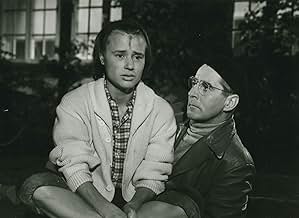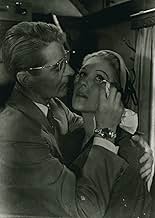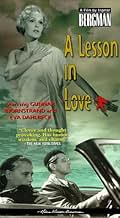IMDb-BEWERTUNG
7,0/10
3929
IHRE BEWERTUNG
Füge eine Handlung in deiner Sprache hinzuAfter a 15-year marriage, the spouses are going to divorce, but suddenly find out that their feelings have not vanished yet.After a 15-year marriage, the spouses are going to divorce, but suddenly find out that their feelings have not vanished yet.After a 15-year marriage, the spouses are going to divorce, but suddenly find out that their feelings have not vanished yet.
Birgitte Reimer
- Lise
- (as Birgitte Reimers)
Georg Adelly
- Bartender
- (Nicht genannt)
Ingmar Bergman
- Narrator
- (Nicht genannt)
- …
Julie Bernby
- Guest at Wedding
- (Nicht genannt)
Henning Blanck
- Guest at Wedding
- (Nicht genannt)
Tor Borong
- Gentleman
- (Nicht genannt)
Yvonne Brosset
- Dancer in Bar
- (Nicht genannt)
Olle Ekbladh
- Guest at Wedding
- (Nicht genannt)
Empfohlene Bewertungen
The theme of "A lesson in love" is more or less the same as the theme of the "Pina Colada" song of Rupert Holmes (1979). A man and a woman have written off their marriage after 15 years and are both hunting for a new partner. During the hunt they rediscover each other.
As the theme already indicates the film has two types of scenes.
Scenes with respect to the worn out marriage (tragedy).
Scenes with both spouses (but primarily the man) on partner hunt (comedy).
As Bergman says at the beginning of the film: "This is a comedy that could have been a tragedy".
To be honest, the comedy element of this film is rather bad. It is old fashioned, over the top and maybe both. Only a year later Bergman would prove that he knows how to handle a comedy with "Smiles of a summernight" (1955).
With respect to the theme of the film the low quality if the comic scenes proves to be a blessing in disguise. Despite all the fights the family scenes are more sincere and even more hopeful than the flirtation scenes. After all to argue with someone means that you care for someone.
By the way, the real lesson in love is given by the grandparents. They show how to live with the imperfections of your partner without hurting his / her feelings or self esteem. They do so already 50 years.
As the theme already indicates the film has two types of scenes.
Scenes with respect to the worn out marriage (tragedy).
Scenes with both spouses (but primarily the man) on partner hunt (comedy).
As Bergman says at the beginning of the film: "This is a comedy that could have been a tragedy".
To be honest, the comedy element of this film is rather bad. It is old fashioned, over the top and maybe both. Only a year later Bergman would prove that he knows how to handle a comedy with "Smiles of a summernight" (1955).
With respect to the theme of the film the low quality if the comic scenes proves to be a blessing in disguise. Despite all the fights the family scenes are more sincere and even more hopeful than the flirtation scenes. After all to argue with someone means that you care for someone.
By the way, the real lesson in love is given by the grandparents. They show how to live with the imperfections of your partner without hurting his / her feelings or self esteem. They do so already 50 years.
Bergman is a sublime comedy director and writer. This fact becomes apparent in "En lektion I kärlek", where the comic elements range from pure slapstick to deep, yet very emotional scenes. This movie is paves the way for Bergman's later comedies "Sommarnattens leende" and "Kvinnodröm", all of them starring Gunnar Björnstrand as well as Eva Dahlbeck. This is an excellent movie with which to start your Bergman experience, acutely portraying emotional troubles of the young as well as the old. The cinematography by Martin Bodin is astounding, for instance in the picnic scene. In short, the movie is a perfect example of a successful comedy, with a clarity of depth even surpassing some of Bergman's own comedies.
See the lighter side of Bergman in this movie. Marital difficulties and challenges are explored. Even though there's some food for thought, the movie stays on the surface and doesn't go into lenghty analysis. Reminded me about some of Eric Rohmer's films, but without the fine details. Not to worry though, Bergman's lesson in love is still worth watching. It's charming, but mostly funny. It makes for an enjoyable 90 minutes. Great job by the lead actors Gunnar Björnstrand, Eva Dahlbeck and the beautiful Yvonne Lombard. But I would agree with others that the last 30 seconds of the film are questionable.
Seen at home, in Toronto, on January 7th, 2006.
82/100 (***)
Seen at home, in Toronto, on January 7th, 2006.
82/100 (***)
Faced with the inexplicably hostile response to 'Sawdust and Tinsel', Ingmar Bergman felt obliged to make something that would be of wider appeal and the result is a romantic comedy in which Gunner Bjornstrand and Eva Dahlbeck develop the chemistry and comedic timing they had shown in Bergman's earlier 'Waiting Women.' They certainly do justice to his sparkling and intelligent dialogue and he was fulsome in his praise of their invaluable contribution which convinced him that a 'collaborative' style of direction would achieve the best results. Bjornstrand of course remains one of Bergman's most renowned artistes whereas Miss Dahlbeck is alas, one of his most forgotten.
It would not be Bergman of course without a touch of the autobiographical. His affair with Harriet Andersson had broken up his marriage to his third wife who is probably the insiration for the character of Marianne and although he fundamentally believed in the married state, he was all too aware of his failings as a husband.
Bergman's intention here is 'to have fun at mine and my fellow human beings' expense.'
This delectable piece can be savoured as an hors d'oeuvre to the main course of 'Smiles of a Summer Night'.
It would not be Bergman of course without a touch of the autobiographical. His affair with Harriet Andersson had broken up his marriage to his third wife who is probably the insiration for the character of Marianne and although he fundamentally believed in the married state, he was all too aware of his failings as a husband.
Bergman's intention here is 'to have fun at mine and my fellow human beings' expense.'
This delectable piece can be savoured as an hors d'oeuvre to the main course of 'Smiles of a Summer Night'.
Bergman really liked this reflecting back on summer thing, huh?
After Summer Interlude, Summer with Monika, and Wild Strawberries, it's a well he obviously found some merit in. Here we see it again in a story of a husband and wife taking a train to Malmo, Sweden (and then on to Copenhagen on a ferry) as they reflect back on their marriage.
Tonally, the movie has much more in common with Smiles of a Summer Night than the other three. It's a farce, through and through, and it's rather delightful. However, it's not really Bergman's strength, so while he makes the film entertaining and quite funny at times, he can't commit as fully to the concept as he might like. His instinct tend more towards darker ruminations, which ends up creating some tonal shifts that don't really help the movie at times.
And yet, the movie is still, largely, quite entertaining.
We begin with the dissolution of an affair between David and his lover, the much young Susanne. He's concerned that he's going to lose his family and that his wife will divorce him. The fight ranges from comic to very serious and ends with Susanne unhappily dumped. David, a gynecologist, skips out the rest of his day to catch a train. There he meets a man and a woman. The man, a salesman, bets David that he can kiss the woman before the next stop. After he gets a good slap, we remain with David and the woman and slowly realize through their bit of foreplay that the woman is David's wife, Marianne.
They go back and forth about whether their mutual affairs will continue and whether Marianne will divorce him or not. All through this, the two reflect back on different stages of their marriage, including memories around their children and his father. The memories move from extremely bitter (when Marianne discovered David and Susanne in a hotel together) to their happiest (just the mere summer before when they celebrated David's father's 73rd birthday together). As they spend time together, their memories become warmer towards each other.
The movie ends with a purely farcical display of David igniting Marianne's jealousy in a dingy bar by kissing a strange women (heavily implied to be a prostitute). A slap fight ensues and David drags her out. We see a really funny long shot as the two comically walk up and down a street, each trying to wrangle the other in their own ways. The very last shot is a cheeky moment as a cupid walks up to their hotel room and leaves a sign on the door that repeats the movie's title.
The movie really is quite amusing from beginning to end, but again, the tonal shifts that occur don't help the movie out. It's far from Bergman's best, but it really is quite delightful.
After Summer Interlude, Summer with Monika, and Wild Strawberries, it's a well he obviously found some merit in. Here we see it again in a story of a husband and wife taking a train to Malmo, Sweden (and then on to Copenhagen on a ferry) as they reflect back on their marriage.
Tonally, the movie has much more in common with Smiles of a Summer Night than the other three. It's a farce, through and through, and it's rather delightful. However, it's not really Bergman's strength, so while he makes the film entertaining and quite funny at times, he can't commit as fully to the concept as he might like. His instinct tend more towards darker ruminations, which ends up creating some tonal shifts that don't really help the movie at times.
And yet, the movie is still, largely, quite entertaining.
We begin with the dissolution of an affair between David and his lover, the much young Susanne. He's concerned that he's going to lose his family and that his wife will divorce him. The fight ranges from comic to very serious and ends with Susanne unhappily dumped. David, a gynecologist, skips out the rest of his day to catch a train. There he meets a man and a woman. The man, a salesman, bets David that he can kiss the woman before the next stop. After he gets a good slap, we remain with David and the woman and slowly realize through their bit of foreplay that the woman is David's wife, Marianne.
They go back and forth about whether their mutual affairs will continue and whether Marianne will divorce him or not. All through this, the two reflect back on different stages of their marriage, including memories around their children and his father. The memories move from extremely bitter (when Marianne discovered David and Susanne in a hotel together) to their happiest (just the mere summer before when they celebrated David's father's 73rd birthday together). As they spend time together, their memories become warmer towards each other.
The movie ends with a purely farcical display of David igniting Marianne's jealousy in a dingy bar by kissing a strange women (heavily implied to be a prostitute). A slap fight ensues and David drags her out. We see a really funny long shot as the two comically walk up and down a street, each trying to wrangle the other in their own ways. The very last shot is a cheeky moment as a cupid walks up to their hotel room and leaves a sign on the door that repeats the movie's title.
The movie really is quite amusing from beginning to end, but again, the tonal shifts that occur don't help the movie out. It's far from Bergman's best, but it really is quite delightful.
Wusstest du schon
- WissenswertesCameo: When the doctor (Gunnar Björnstrand) enters the train a tall lean man in a beret reading a newspaper is standing in the doorway. This is no one less than Ingmar Bergman himself.
- PatzerDuring the conversation between David and his wife by the microscope, the shadow of the microphone can be seen on the wall for a large part of the scene.
- VerbindungenFeatured in Stjärnbilder (1996)
Top-Auswahl
Melde dich zum Bewerten an und greife auf die Watchlist für personalisierte Empfehlungen zu.
- How long is A Lesson in Love?Powered by Alexa
Details
- Laufzeit1 Stunde 36 Minuten
- Farbe
- Sound-Mix
- Seitenverhältnis
- 1.37 : 1
Zu dieser Seite beitragen
Bearbeitung vorschlagen oder fehlenden Inhalt hinzufügen

Oberste Lücke
By what name was Lektion in Liebe (1954) officially released in India in English?
Antwort






























